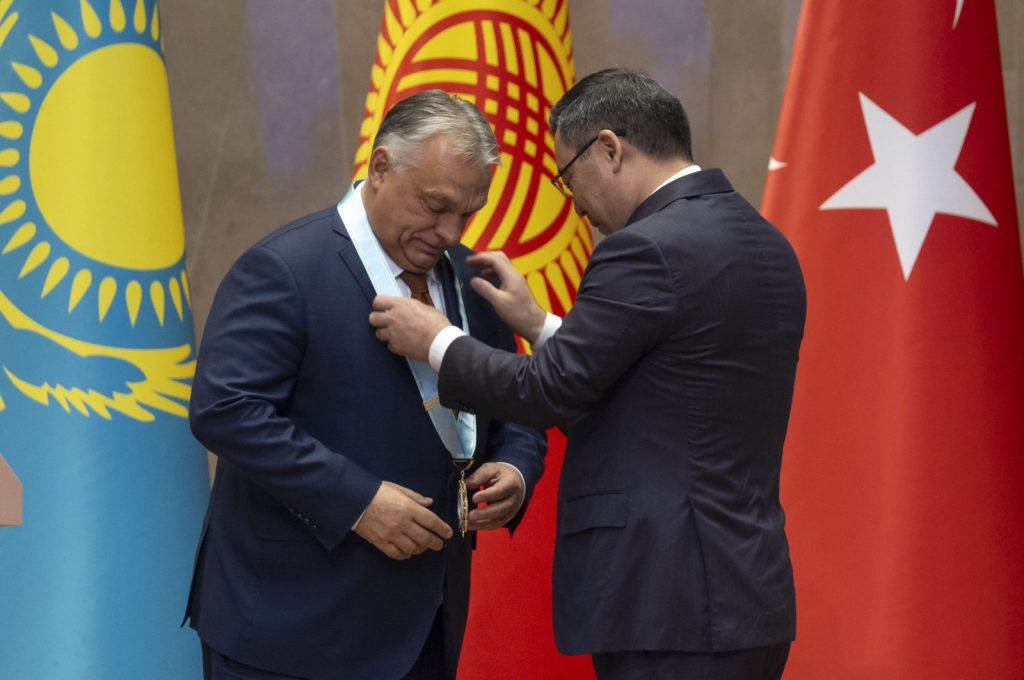In 2024, the Organization of Turkic States (OTS) marked its 15th Anniversary. Over the past 15 years, the OTS and its members have experienced a unique journey to be stronger and unified. In this respect, Turkic nations have been promoting mutual development and raising a common voice on the global stage. Bound together by a common history, tradition, language and culture, they must take important steps to address global challenges while deepening their cooperation. There is no doubt that 2021 was a milestone when the organization’s name was changed to the Organization of Turkic States, symbolizing more integration than ever. Of course, in such a vision, like other international organizations, each member country became more meaningful and ready to contribute to this unity.
The last summit of the OTS in Bishkek was held on Nov. 6, during which Hungary was declared the host of an informal summit of OTS in 2025. Hungary is considered “the most Eastern of the Western and the most Western of the Eastern related” member of OTS, which has launched extensive foreign policy initiatives formulated with connectivity in the last one and half decades. Along with new initiatives, rich historical and cultural ties, and improving relations with Türkiye, it directly reflected Hungary’s interest in the Turkic states. In this respect, Hungary opened embassies in Central Asian countries and this transformed into multilateral platform-based relations in 2018 when Hungary attained observer status. In 2021, Hungary became an observer member state of the OTS. Since then, the country’s increasing visibility and role regarding connectivity and multilateralism can be analyzed.
Between Europe and the Turkic world
Hungary’s involvement in OTS meetings and initiatives is useful since it allows for developing semi-institutional connections. Indeed, high-level collaboration was inspired during OTS meetings rather than between individual member nations, and the entire community benefits from such relationships. Multilateralism in the OTS allows multilevel and flexible cooperation in diverse sectors, from transportation to education, trade and energy. Also, multilateralism fosters bilateral cooperation and contributes to the development of relations. Hungary has also established strategic partnerships with Kazakhstan, Kyrgyzstan and Azerbaijan.
In addition to this, the observer membership of Hungary built a concrete bridge between the European Union and OTS as well, especially after the opening of the Turkic States Representation Office in Budapest based on Hungary’s proposal in 2018. The office’s mandate is to promote the organization and its operations throughout Europe, as well as to help improve connections with European institutions. For example, an agreement on a strategic partnership in green energy was signed in Bucharest in December 2022 between the governments of Azerbaijan, Hungary, Romania and Georgia. In other words, Hungary is not solely the gate of Europe at the center. Hungary’s increasing and stronger role in the OTS can also open opportunities for new multilateral platforms for different actors in the long term.
Secondly, connectivity as an essence of Hungarian economic policies found strong ground along with the Hungarian Eastern opening strategy through the OTS. Connectivity strengthens a country’s resilience, increases the rate of return on investment and economic productivity in general, promotes the formation of innovation clusters and is particularly suitable as a breakout strategy. As the number of contacts grows, so does the country’s economic influence. Hungary’s Eastern Opening strategy and its efforts to establish cooperation agreements with Turkic states are thus driven by preserving its national identity and possible energy cooperation.
In light of this, Hungary, with its observer status in the OTS, addresses regional cooperation in trade, energy and related fields, while Western institutions can’t handle global turmoil. Especially after 2022, the Russian-Ukrainian war and its consequences fuelled energy cooperation, which is visible and strongly emphasized for Hungary. As Hungarian Foreign Minister Peter Szijjarto said, energy cooperation with OTS members boosted Hungary’s energy security, pointing to gas deliveries from Turkiye and Azerbaijan, as well as the start of production at a Kazakh gas field by the Hungarian oil and gas company MOL. Thus, the increasing role of Hungary in the OTS is a direct result of connectivity as well as the Eastern Opening policy, which has benefited its energy sector and related fields.
Stronger together: 2040 vision
Just a week ago at the Bishkek summit, OTS member countries adopted historical decisions in various fields, from climate change to space security and the banking system. Hungary is not only part of these agreements and decisions. Prime Minister Viktor Orban was rewarded with the highest title of the Supreme Order of the Turkic World, which is the highest recognition given to outstanding leaders who make a significant contribution to the strengthening of unity and cooperation between the Turkish states, as well as to the maintenance of the common cultural heritage.
While Hungary has already started to prepare for the 2025 informal OTS summit, the future direction of Hungary in the OTS can be seen in Orban saying that the relationship between Hungary and the Turkic world should not be a closed past but a living relationship.


